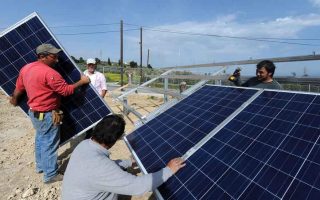Priority to renewable energy

Environment Minister Kostis Hatzidakis has decided to cut the red tape on renewal energy projects by dispensing some of them from environmental impact assessments and simplifying the approval procedures for others.
The aim of these decisions is to reduce the time from the submission of a plan to implement a renewable energy project to its approval to two years.
A newly voted environmental law has provided incentives to build solar farms with a total capacity from 0.5 to 1 megawatts.
Previous legislation dispensed solar farms up to 0.5 MW from the environmental impact assessment; the current one raises this to 1 MW.
Also, solar farms with a capacity from 1-10 MW are put into a category allowing rapid use-of-land approval for projects. The previous capacity limit was 2 MW.
Wind farms, whose installation is often opposed by some locals and environmental groups, also benefit from this quick approval: The capacity limit for them is also raised to 10 MW, from 5 MW previously.
There are also steps being taken to facilitate on-site energy storage.
The installation permit, a further stage in the approval process and a separate one from the environmental impact assessment, will be tackled next, with the Energy Regulatory Authority allowed to simplify the issue of such permits.
One of the main aims of the government’s plan to give priority to renewable energy is to ensure the main producers of lignite, the environmentally “dirty” brown coal set to be phased out, do not suffer. These areas include the cities of Amyntaio and Ptolemaida in the north and Megalopoli in the south, in the Peloponnese.
Phasing out lignite is a hot political issue in these areas, where people see the loss of thousands of jobs far outweighing the health benefits to themselves – lignite has seriously affected the health of inhabitants in these areas.
During a meeting at the Environment Ministry this week, officials decided to apply to the European Union for permission to adopt tax incentives that will attract businesses to these areas and support existing ones. The tax incentives would include special low taxes and rebates.
The government also wants to cut employers’ social security contributions and fast-track approval for new businesses.





